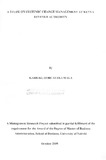| dc.description.abstract | Organizations change due to many causes, with major changes occurring quite often spanning up to three years, while minor changes take place continuously. There are no signs that this pace of change will slow down. Changes in public corporations are sparked by challenges of growth, technology, competitive pressure and increasing awareness of stakeholders regarding their rights and expectation from government departments. The Kenya Revenue Authority presents such a striking example of a complex organization in the public sector that has successfully embraced change. It has emerged as one of the most successful public sector organizations in Kenya. This achievement has primarily been a culmination of measures and reform agenda focusing on automation of manual processes (KRA, 2009). The Kenya Revenue Authority has modernized its procedures to eliminate bureaucracy that is common in public corporations. To get a complex organization that has modernized and reformed its systems is worth studying at least to find out how the Kenya Revenue Authority management succeeded.
The objectives of this study were to establish systemic change management practices
employed by the Kenya Revenue Authority in its quest to implement systemic changes and to
determine the factors that led the management to change its systems. The case study method was preferred. Both primary and secondary data was used in the research. The interview guide was used to collect primary data from selected respondents. Qualitative data analysis was used.
The study concludes that KRA spared time to anticipate the systemic changes it was to
undergo by conducting various studies, preparation of situational analysis reports and
corporate plans/BSC spelling out the changes to be implemented and respective time frames.
The study also concludes that systemic change have been successfully managed at KRA and
the adoption of the new systems have resulted in the public being made more aware of what
KRA is doing, staff becoming more technologically advanced, increased accountability
among staff and improved corporate image of KRA.
The study recommends that for the staff to fully appreciate and use the KRA new systems
comfortably there is need for more training in IT skills, more involvement of all stakeholders
and provision of computers to all staff | en |

